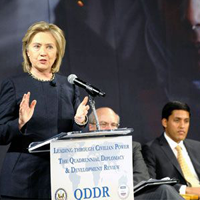It has been depressing to watch the reaction of the American foreign-policy establishment to the Wikileaks debacle. Visceral rage has predominated, of course, but it has been mixed with a misplaced pride in the quality of State Department diplomacy.
The leaks, we are told, provide reassuring evidence that all is working as it should be. Fareed Zakaria, for example, praised the insight and breadth of the analysis on offer. The cables, he wrote, are "well wrought" and reveal "clever minds" at work, with the best of them resembling something "straight out of Evelyn Waugh."
Such complacency comes as no surprise. In diplomacy, the cult of the gifted amateur took hold early and has never lost its grip: no matter that governments are failing to manage the world's most-pressing problems, as long as our man in Buenos Aires, Beijing or Brussels can write as entertainingly as a junior scribe at the Economist.

